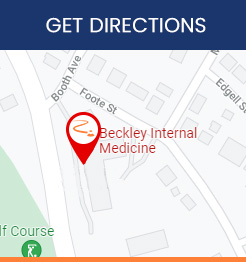Diabetes Doctor in Beckley, WV
Diabetes is a condition that occurs when your blood sugar level is abnormally high. Diabetes affects an estimated 30 million individuals in the United States. It causes your body to produce and utilize insulin inefficiently. It significantly contributes to blindness, renal failure, heart attacks, stroke, and amputation of lower limbs. If you or someone you love is living with diabetes, Dr. Elizabeth Thompson Nelson, MD, at Beckley Internal Medicine can help to live a better quality of life. For more information, contact us or schedule an appointment online. We are conveniently located at 2401 South Kanawha Street, Ste 100, Beckley, WV 25801.


Table of Contents:
What can I expect from a diabetic doctor?
What questions should I ask my doctor about diabetes?
What are the first signs of being diabetic?
Diabetes is a common condition in which the body does not produce enough insulin or cannot process it properly; insulin is a hormone that helps the body use glucose, or blood sugar, for energy. When diabetes occurs, the amount of glucose in the blood is higher than normal because it cannot be metabolized properly or is not produced in sufficient amounts. Diabetes can affect any part of the body, but it usually first affects the blood vessels, causing a wide range of symptoms. Some of the most common diabetes symptoms include: excessive thirst, lack of appetite, weight loss or gain, and fatigue.
Diabetes doctors provide ongoing care and management for patients with diabetes. They can provide advice on healthy eating and living an active lifestyle, which can reduce the complications of diabetes and greatly improve a person’s quality of life. Very importantly, they also monitor the patient’s condition and provide up-to-date information on the progression of their disease. Furthermore, they also take measures to reduce risks through prevention methods and recognizing ways to identify the symptoms of diabetes-related health issues.
Diabetes is a complex condition that requires careful monitoring in order to properly manage. It is important to ask the right questions when meeting with a diabetes doctor, including:
– Should I check my blood sugar levels? How often should I check them?
– What are my ideal blood sugar levels?
– What are the warning signs or symptoms that my blood sugar levels are too high, and what should I do if they spike?
– What are the warning signs or symptoms that my blood sugar levels are too low, and what should I do if they drop?
– How can I improve my lifestyle & diet?
– What are my medications’ side effects?
– Will I always need medications/insulin?
– What are the long term complications of diabetes? How can I avoid them?
The first signs of diabetes can vary depending on the type of diabetes as well as its severity. Common signs of both diabetes include:
Hunger and Fatigue: Our bodies convert food into glucose that is used as energy by our cells. Insulin is a fundamental part of this process; if the body does not produce enough, or has a resistance to insulin, the glucose cannot enter the cells and convert it to energy. This results in feeling hungrier and more tired than usual.
Thirst and Frequent Urination: Typically, people usually urinate between four and seven times a day, but diabetics often urinate much more frequently. This is because the body reabsorbs glucose as it passes through the kidneys, but when diabetes increases blood sugar, the kidneys may not be able to bring it all back in. This results in increased urine production, which takes more fluids, causing thirst.
Dry Mouth and Itchy Skin: When a person has diabetes, their body is using fluids to make urine, which means that there is less moisture for other things. This can result in dehydration, dry mouth and itchy skin.
Blurred Vision: The lenses in the eyes can swell up due to changing fluid levels in the body. This can cause the eyes to change shape, making them unable to focus.
Type 2 Diabetes can cause different symptoms than other types, including any of the following:
– Yeast infections
– Between fingers and toes
– Under breasts
– In or around sex organs
– Slow-healing sores or cuts
– Pain or numbness in feet or legs
The symptoms of Type 1 Diabetes can also differ from other types, which may include:
– Unexplained weight loss
– Nausea and vomiting
Gestational Diabetes, which is a type of diabetes that can occur during pregnancy, does not typically cause symptoms other than feeling thirstier than normal and a more frequent need to urinate.
Complications of type 2 diabetes may include:
– Slow-healing sores or cuts
– Itchy skin (usually around the groin area)
– Frequent yeast infections
– Recent weight gain
– Acanthosis nigricans, or velvety, dark skin changes
– Numbness and tingling of the hands & feet
– Decreased vision
– Impotence or erectile dysfunction (ED)
Hypoglycemia, or low blood sugar, is a common symptom of diabetes, which can cause a person to feel:
– Shaky
– Nervous or anxious
– Sweaty, chilly or clammy
– Cranky or impatient
– Confused
– Lightheaded or dizzy
– Hungry
– Sleepy
– Weak
Tingly or numb in lips, tongue, cheeks
It might also cause:
– Fast heartbeat
– Pale skin
– Blurred vision
– Headache
– Nightmares or crying during sleep
– Coordination problems
– Seizures
Hyperglycemia, or high blood sugar, may cause:
– Heavy thirst
– Blurry vision
– Frequent urination
– More hunger
– Numb or tingling feet
– Fatigue
– Sugar in urine
– Weight loss
– Vaginal and skin infections
– Slow-healing cuts and sores
Call us today to book an appointment with our diabetes doctor, or visit our clinic conveniently located at 2401 South Kanawha Street, Suite 100, Beckley, WV 25801. We look forward to serving you! We serve patients from Beckley WV, Bradley WV, Daniels WV, Shady Spring WV, Sophia WV, Lester WV, Stanaford WV, Macarthur WV, Mount Hope WV, Baylor WV, and Beaver WV.


Additional Services You May Need
▸ Internal Medicine
▸ BioTE
▸ Medical Weight Loss
▸ Physical Exams
▸ Bio Identical Hormone Replacement Therapy
▸ Pelvic Exams
▸ PAP Smears
▸ Family Planning
▸ Diabetes Management
▸ Hyperlipidemia





